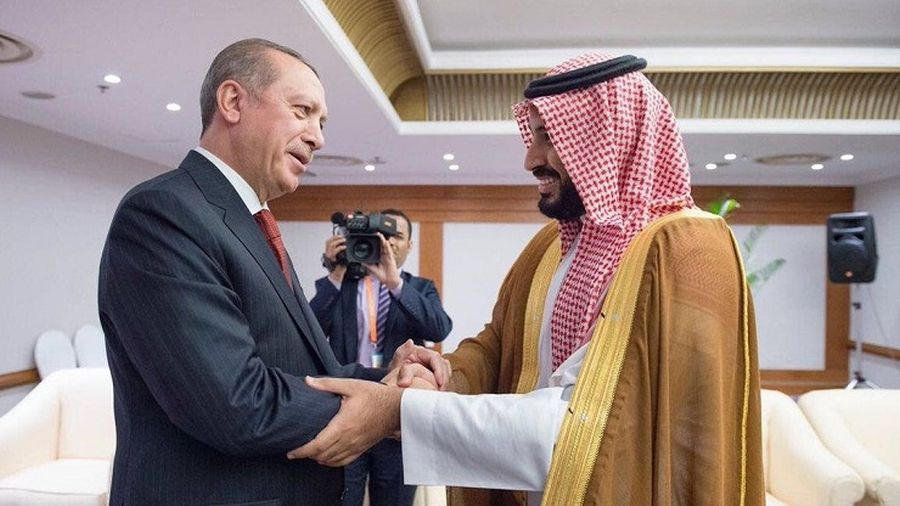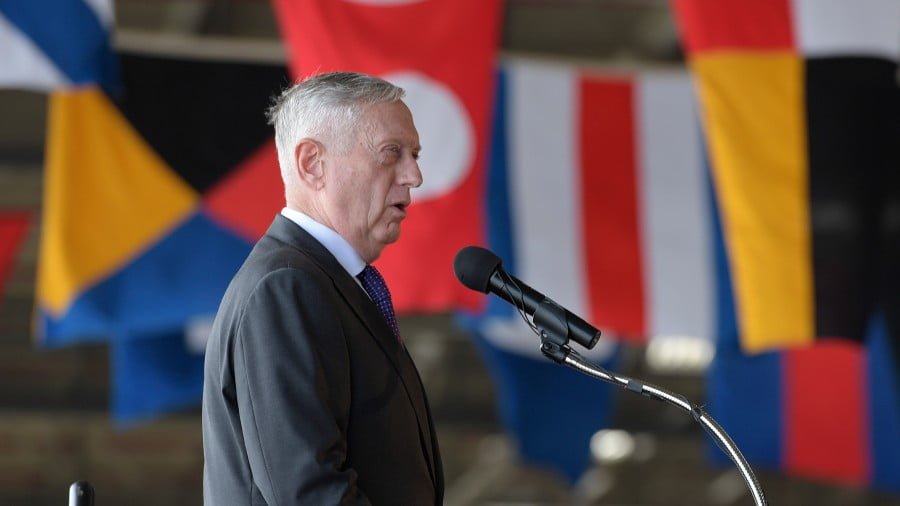Why Erdogan is in a Rush for Peace with Saudi Arabia?
On April 28 the Turkish president Recep Tayyip Erdoğan arrived in Saudi Arabia for an official visit which is already called symbolic for Ankara and Riyadh. As reported by Turkish media, Erdoğan had a meeting with the Saudi king Salman bin Abdulaziz followed by a meeting with Crown Prince Mohammed bin Salman at the Al-Salam Palace. The Turkish delegation included high ranking officials such as Minister of Justice Bekir Bozdağ, Minister of Treasury and Finance Nureddin Nebati, Minister of the Interior Süleyman Soylu, Minister of Culture and Tourism Mehmet Nuri Ersoy, and Minister of National Defense Hulusi Akar. Speaking of cooperation between Saudi Arabia and Turkey, the Turkish president posted that the two countries are interested in widening the cooperation in areas such as healthcare, energy, food safety, agriculture technologies, defense industry and finances.
Previously Turkish president visited Saudi Arabia in July 2017, however afterwards Ankara-Riyadh relations significantly strained especially after the killing of the Sauidi journalist Jamal Khashoggi in October 2018 in Istanbul. The Washington Post called Khashoggi ‘a prominent critic of the Saudi government and namely Prince Mohammed bin Salman’ and stated that ‘this story had MI6 fingerprints all over it.’ One of the reasons was that Khashoggi’s cousin – Dodi Fayed was Princess Diana’s boyfriend when they both died in a car crash in 1997. Then Erdoğan supported the American story which claimed that Crown Prince was personally involved in this. The whole world found out about this thanks to the Turkish device preemptively planted in the building of the Saudi consulate in Istanbul. Afterwards the Turkish media systematically promoted the scandal, thus undermining bin Salman.
With the two countries openly claiming leadership in the region, at the time the Turkish president attempted to use the most of the Khashoggi incident in order to present himself as the most powerful Middle Eastern leader capable of delegating control and governing of the region. But he miscalculated.
Also Erdoğan failed to use as planned the expansion within utmost important Saudi interests, in the Saudi – Qatar conflict. Then Turkey made an agreement with the emir of the State of Qatar, which stipulated the dispatch of Turkish food, products, and, of course, troops.
Another failure of the Turkish president was his support for spreading of the Islamic Brotherhood (prohibited in the Russian Federation) in the Middle East, a social version of Islam perceived by Saudi Arabia as an existential threat to the house of Saud. The political positioning of this organization has long been considered by many Saudi ulamas as a budding opposition power, which doubted the necessity of the monarchy. After the 9/11 attacks the criticism of this organization has become more prominent in Saudi Arabia. This is also due to the fact that the US put a great pressure on Riyadh to change its policy and cease support to certain Islamic organizations and institutions, including those connected to the Islamic Brotherhood, and to strengthen the information war against them in Saudi media. In 2002 the Minister of Foreign Affairs of Saudi Arabia Nayef bin Abdulaziz gave an interview to the Kuwaiti newspaper attacking the Islamic Brotherhood, calling them the ‘root of the evil’ and stating that they are responsible for all the problems of the Arab and Islamic world. The Saudis’ views on the Islamic Brotherhood became even more dire after the death of king Abdullah bin Abdulaziz Al Saud in January 2015.
However, all of Erdoğan’s measures to oppose Saudi Arabia immediately came to a halt due to serious issues experienced by Turkey itself. The result of the latest polls show that approval ratings of the ruling the Justice and Development Party, whose leader is Recep Tayyip Erdoğan, have dropped to 28.9 per cent, while the ratings of its ally Nationalist Movement Party plummeted to 6.1 per cent. The Turkish lire began a steep descent with annual inflation reaching 61.5 per cent in March (against 54 per cent in February), the level last indicated in 2002 before the Recep Tayyip Erdoğan’s presidency. This has been accompanied by serious international crises demanding additional attention and expenses from Turkey (Ukraine, Iran, the new status quo in Europe etc.). Besides, waning of the US global leadership has recently increasingly sped up leaving a gaping vacuum of influence and struggle for it.
Facing the increasing problems and realizing that Turkish economy is not ready for the ambitious previously held by the Turkish leader, Erdoğan took the course towards reconciliation with some of his regional opponents, using said rapprochement to support his lately declining ratings inside and outside the country. This is what caused rapprochement between Ankara, Israel, the UAE, Egypt and Saudi Arabia. At the same time Erdoğan understands, that in the newly adjusted policy it is Saudi Arabia that can become the key link, since, firstly, it is Riyadh that wields important influence on Cairo, which in turn has become a crucial element in Ankara’s regional policy. Secondly, Erdoğan objectively needs Saudi money and market.
That is why it doesn’t come as a surprise that before his visit to Riyadh Erdoğan began talking about his hope to start a new era in the bilateral relations, strengthening collaboration in defense and finances. The last aspect has been highlighted by many analysists especially given the prolonged economic crisis in Turkey with record levels of inflation and significant decrease of the national currency.
Lately in order to expedite rapprochement with Riyadh Erdoğan has taken several steps resulting in, for instance, 25 per cent increase in the first quarter of 2022 in export from Turkey to Saudi Arabia. However, the Saudis demanded the final decision on the Khashoggi’s case, which led to factual closing of the case by Ankara. According to the special adviser to the President of Turkey İbrahim Kalın, this decision turns over a leaf in Ankara – Riyadh relations, finalizing the feud between the leaders of the two countries. It also opens the door for a personal visit of Recep Erdoğan to Saudi Arabia.
Earlier in February Erdoğan visited the UAE for the first time since 2013 as a part of the adjusted policy on course to restoration of relations in the region. During his visit the countries signed an agreement on the currency swap for $ 5 billion, which will increase exhausted currency reserves of Turkey going through historic economic hardship. Erdoğan and the Crown Prince of the Emirate of Abu Dhabi Sheikh Mohamed bin Zayed also signed 13 cooperation agreements encompassing many sectors, including defense and trade.
That is why it is no surprise, that one of the first reactions to Erdoğan’s visit to Riyadh was a statement by the diplomatic adviser to the UAE President Anwar Gargash who pointed out that ‘The visits of Turkish President to the UAE and Saudi Arabia, and the adoption of the approach of communication and rapprochement, is a positive step for the benefit of the region as a whole.’
Erdoğan’s visit to Riyadh undoubtedly is a certain sign of ‘thaw’ in relations not only between the two states but in the region as a whole. But the East is a complicated matter and here serious political insults of the past are not easily forgotten.
After President Recep Tayyip Erdoğan visited Saudi Arabia, on March, 1 the Turkish Sabah already ran a public statement by the Minister of Foreign Affairs Mevlüt Çavuşoğlu who said that Ankara is working to normalize the Egypt ties after the ‘progress’ with Saudi Arabia and the UAE had been achieved. “The process started with Egypt earlier, but it progresses a little slower. For example, it started with the UAE and continued very quickly. Likewise with Bahrain. There was a process that started with Saudi Arabia, we had talks. Ultimately, this is part of our strategy to normalize our relations,” Çavuşoğlu stated.







